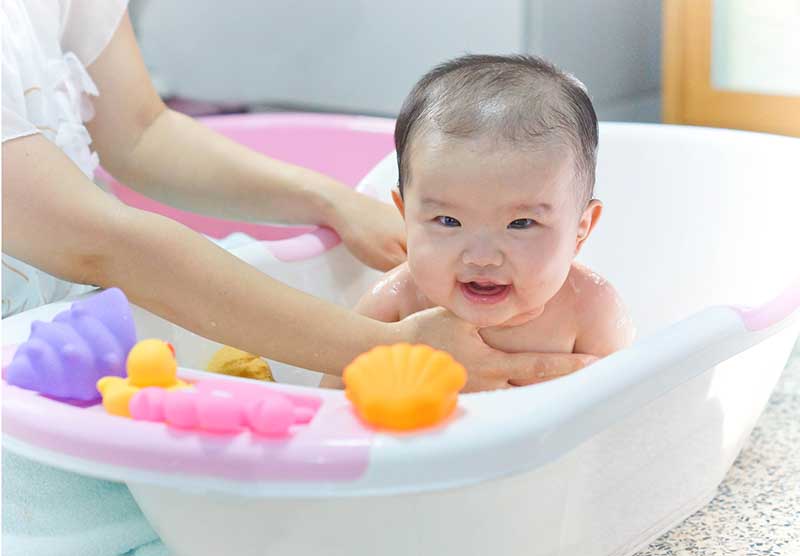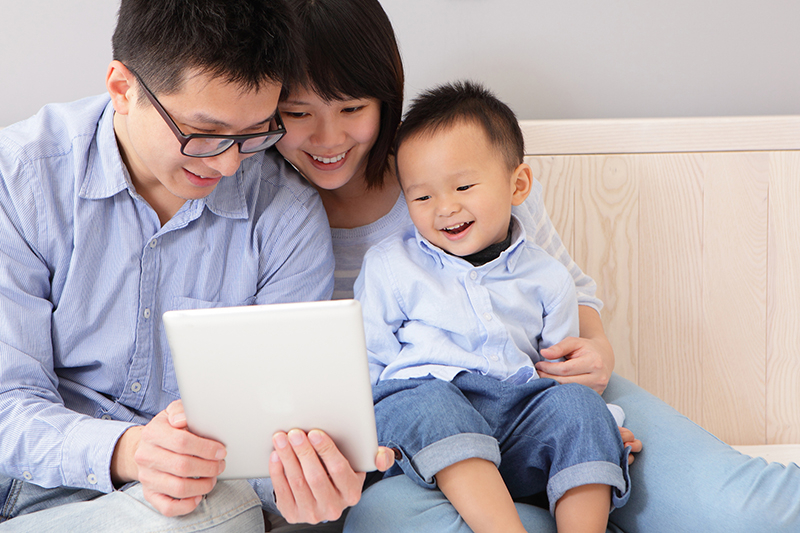Families For Life | Healthy Screen Time and Quality Media Choices: 2-5 Years-Toddlers

DID YOU KNOW?
Bath time is a good way to soothe your baby but it can also be a fantastic learning opportunity for your child. Learn how you can engage him during bath time.
READ MORE

Screen time is a part of life for many pre-schoolers. If your child uses screens, it’s important to think about what educational and other benefits your child is getting from screen time. It’s also important to help your child develop healthy screen time habits. At this age, you still have a big role in managing your child’s overall screen time.
Screen time for pre-schoolers
Screen time for pre-schoolers is about choosing quality programmes and apps and developing healthy screen habits.
Child development experts also recommend limiting children’s daily screen time. Screen time limits can help lower the risks of screen time for your child, which include physical, developmental, safety and other risks.
The most recent guidelines from the American Academy of Pediatrics (AAP) say that children aged 2-5 years should have no more than an hour a day of screen time with an adult watching or playing with them.
When you help your young child combine good-quality media choices with healthy screen habits and screen time limits, he’ll be set up to make the most of screen time now and in the future.
Why screen time quality is important
Screens are a part of life for many pre-schoolers.
If you’re thinking about whether your child should watch TV or play on your phone, here’s a key question to ask: is this programme, video or app good quality? Good-quality media can support your child’s learning, especially if it ties in with her interests or sparks her imagination.
For example, a five-year-old can get a lot out of spending 30 minutes creating an artwork on a screen because this develops his imaginative use of shape and colour. It’s much better than if he spends 30 minutes watching online animations that advertise and sell toys.
Choosing good-quality apps and games for pre-schoolers
Good-quality apps or games for pre-schoolers:
encourage creativity – for example, by getting children to draw pictures, create stories or make simple choices about which characters to be
encourage problem-solving – for example, by getting children to work out the most appropriate clothes to dress online characters in for rainy weather
develop communication skills – for example, by encouraging children to learn other languages
develop social skills – for example, by encouraging children to take turns in games
build on interests – for example, by getting children to build with virtual blocks if they like playing with blocks.
Other practical things to think about include:
age range – it’s a good idea to check that the age range for an app or game matches your child’s age
advertising – be wary of apps that feature movie characters or popular products, because these apps are often designed to promote movies and products
privacy settings – check the terms and conditions to see whether and how apps collect data, and make sure you’re comfortable with what data will be collected and what it will be used for.
Choosing good-quality TV programmes, movies and videos for pre-schoolers
Good-quality TV programmes, movies and videos for pre-schoolers:
have positive messages about relationships, family and life – avoid those that make violence or bad attitudes look good
inspire new off-screen play ideas for children after they’ve finished watching
have good stories like those that involve characters treating each other fairly – avoid programmes that are just about selling promotional toys, apps and gear
are age appropriate – for example, the stories and themes of some movies are too mature and complex for young children to fully understand.
Online reviews can help you decide whether a movie, app or game is high quality and has educational benefits. Try reviews on Common Sense Media. Use the Info-communications Media Development Authority's (IMDA) classification to find out what different age classifications mean.
Healthy screen time habits for pre-schoolers
Developing healthy screen time habits is an important part of making the most of screen time. If your child develops healthy screen time habits while she’s young, these habits will help her make better choices about how to use her free time when she’s older.
Here’s how you can get started on these habits with your pre-schooler.
Role-modelling healthy screen time habits
Your child learns screen time habits from you. This means you can model healthy screen habits by using screens in the way you want your child to use them – for example, by switching your phone off during dinner, or turning the TV off when you’ve finished watching a programme.
You can also set a good example by not always using technology to keep your child entertained in situations like long car journeys or while waiting at the hairdressers. Try mixing it up with things like playing ‘I spy’ or drawing. When you know you’re going to be in these situations, you could try packing an activity bag with puzzles, books, drawing materials and so on.
Playing on a device in boring situations will usually distract your child, but it can mean your child misses an opportunity to learn social skills like how to act in public, or how to manage boredom in creative ways. It can also mean your child ends up relying too much on technology for something to do.
Teaching your child about quality screen time
Pre-schoolers can start learning about what makes a good TV programme, movie, app and game. If your child wants to get a new app or watch a TV programme, you can look at it together to see whether it’s good quality and safe.
And if you play or watch with your child, you can start getting him in the habit of thinking about what’s on the screen rather than just passively watching. For example, you can sit with your child while he plays an app and ask questions like ‘How do you play this game?’ and ‘What happens when you move there?’. Or if you’re watching TV together, you could ask ‘What would happen if you did what that person did?’
Balancing screen time with other activities
Screen time can be a fun, learning experience for your child. But it’s important to balance screen time with other activities that are good for your child’s development. These include physically active play, creative play like solving puzzles and drawing, and conversation with family and friends.
You can find this balance for your child by:
setting screen time limits according to the age of your child and your family’s daily or weekly routine. For example, you might give your child more screen time on the weekend, or extra time to video-chat with a relative who lives overseas
switching off the TV, computer and mobile phones at family mealtimes. This helps even very young children learn about socialising, talking with others and using table manners
setting rules like no watching TV or playing on the tablet until your child has finished her chores
encouraging your child to play outside, draw and play creative games like puzzles.
Managing screen time
One of the best ways to manage screen time is to give your child some choices. For example, you could give your child a list of games and programmes and let him decide how he wants to use his screen time. This teaches your child to think, plan and make choices about electronic media use.
It can help to have a way of marking when it’s time to finish screen time – for example, when it’s dinner time or bath time, or the end of the programme. If you give your child a warning when it’s almost time to stop, she’ll be more likely to cooperate. It’ll also help if you make time to help your child save what she’s doing.
If your child is playing on a device alone, make sure you’ve checked the safety settings. Also check in on your child regularly when he’s online – for example, ask him about what he’s playing or watching. This also sends the message that you’re interested in what he’s doing.
© raisingchildren.net.au, translated and adapted with permission
Explore more